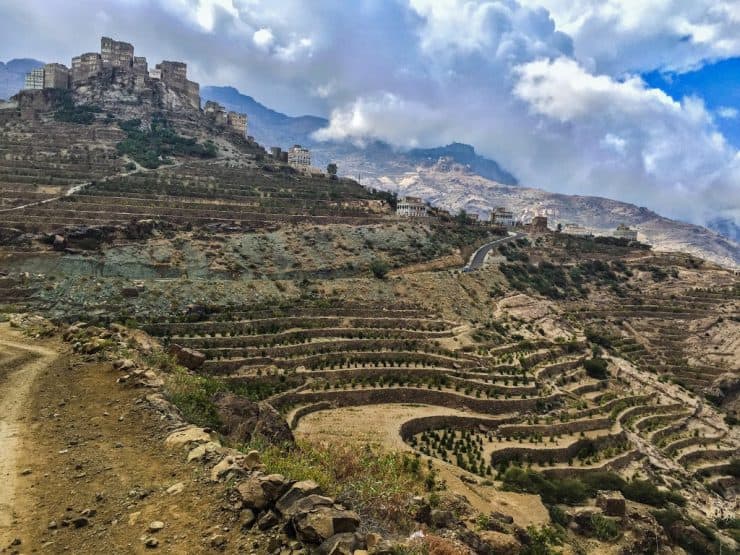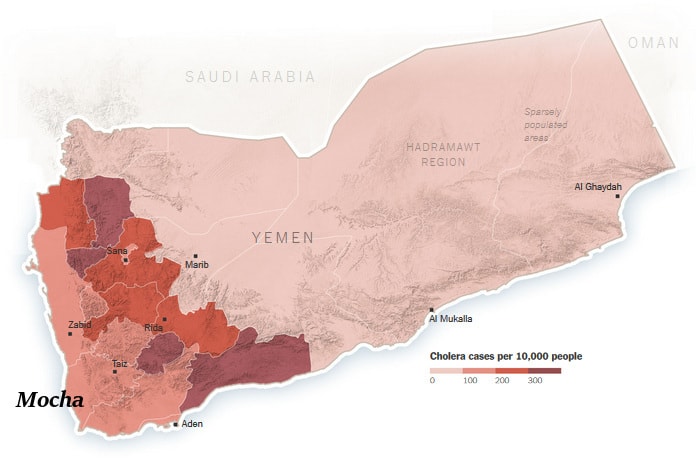Several fine coffees are grown in Yemen near the Red Sea in the mountainous region on the Arabian peninsula's central through southern regions. Yemen coffees still grow, in greatly reduced quantities from their peak, in the region. The terraces are carved into the hills similar to rice paddies and vineyards in other countries so that they can be easily pruned and harvested, and looking like a vast, beautifully manicured estate.

Summer rains bring all sorts of vegetation out in the mountains, turning the region into a picturesque setting. When summer turns to fall however, the area dries out and only the hardiest plants survive, and the coffee ripens and is harvested. Coffees are processed in the traditional method - dry processed with the fruit still on the beans on rooftops. Not wasting any part of the coffee, the dried coffee cherries at used to make the Yemen "Qishr" - what's become recently popular in North America as a Cascara tea.
The term Yemen coffee often refers to Yemen Mocha coffee, a full-bodied coffee with a rich, winey acidity (see Yemen Mocha).
Jump to:
Mocha Coffee
Mocha coffee is marked as either Mattari (which has chocolate overtones and a heavier body) or Sanani (which is more balanced and with a fruity character).
Mocha Sanani coffee is known for its complexity and exotic pungency, while Mattari coffee, which is sometimes blended with Yemen Mocha coffee, is distinguished for its winey acidity.
Along with the Indonesian Java Arabica coffee, Mocha is used to make Mocha Java blend coffee that is a traditional favorite. (See World's Best History of Coffee.) Mocha coffee is one of the first coffees ever cultivated and continues today to be a coffee bean prized by gourmet coffee lovers.
Yemen Coffees
Other respected coffees grown in Yemen include Sharki coffee and Ismaili coffee. Ismaili is a market name and also the name of the distinctive coffee plant varietal which produces a pea-like coffee bean and a distinctive and high-quality brewed cup of coffee.
Not far across the Red Sea lies Ethiopia, and Harrar in particular, which has grown to be world-renown for it's distinctive coffees that are said to be very similar to classic Yemen coffees.
Yemen Ismaili Coffee
Grown in central Yemen, Ismaili is a respected Yemen coffee. Ismaili is a market name and also the name of the distinctive coffee plant varietal which produces a pea-like coffee bean and a distinctive and high-quality brewed cup of coffee.
Mocha Sanani Coffee
One of the two types of Yemen Mocha coffee along with Mattari, Sanani is a market name that is comprehensive and refers to various coffee-growing regions located to the west of the Yemen capital of Sanaa.
A good Sanani coffee exhibits a medium body with a lower acidity than the typical Yemen coffee. Sanani coffee is is well-balanced, with a fruity character, and is distinguished for its complexity and exotic pungence. Sanani coffee is also called Mocha Sanani and Arabian Mocha Sanani.
Mocha Mattari Coffee
One of the finest coffees grown in Yemen, Mattari coffee exhibits a winey acidity and has a character that is somewhat sharper than the typical Yemen style coffee.
Arabian Mocha Mattari coffee has a slightly heavier body than Sanani coffee and often displays chocolate overtones.
Mattari is grown in Bani Mattar, which is located west of the Yemen capital of Sanaa.
War and Disease
While Yemen hasn't produced much coffee in decades (it actually peaked in the 17th century), recently the region has undergone civil war and a massive outbreak of diseases such as Cholera.

The infamous port of Mocha is at very South-West tip of Yemen, surrounded by a sea of red where a lack of infrastructure thanks to war has led to Cholera outbreaks that have crippled the country. As many as 452,000 cases have been reported up to late 2017, leading the UN to declare it the world's largest humanitarian crisis. More information can be found in this NYTimes article.
Yemen Coffee and Espresso Brewing Tips
For tips on brewing the perfect cup of Yemen coffee see the Espresso Coffee Guides section on coffee brewing.
For the history of espresso and coffee see World's Best History of Coffee, and for a complete list of coffee terminology with detailed definitions see the Espresso Coffee Guides Coffee Terms.
Buy Gourmet Coffee Beans
- ✔️ Fresh roasted to order
- ✔️ 100% high qualtiy Arabica coffee
- ✔️ Custom grind (or whole bean)
- ✔️ 1-way valve, laminate bag (for freshness)
- ✔️ Bulk discounts
Green Coffee Production
| Year | 60kg bags | Coffee grown |
| 2016 | 125,000 bags | 16,500,000 pounds |
| 2015 | 138,357 bags | 18,263,084 pounds |
| 2014 | 150,076 bags | 19,809,992 pounds |
| 2013 | 185,056 bags | 24,427,379 pounds |
| 2012 | 187,525 bags | 24,753,313 pounds |
Green Coffee Exports
| Year | 60kg bags | Coffee exported |
| 2016 | 0 | 0 pounds |
| 2015 | 8,360 | 1,103,520 pounds |
| 2014 | 20,080 | 2,650,560 pounds |
| 2013 | 55,060 | 7,267,920 pounds |
| 2012 | 57,530 | 7,593,960 pounds |
Data may not be available for the most recent year.
Source: ICO


Leave a Reply